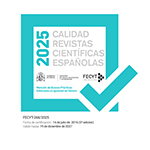That ambiguous word. The discourses on the figure of the intellectual in Spain, 1889-1914
Abstract
The final years of the nineteenth century and the first decade of the twentieth were crucial in the appearance and consolidation of the figure of the modern intellectual in Spain, in a process which was analogous to those happening elsewhere in Europe around the same time. However, this did not mean that a clear and generally agreed–upon idea of what an intellectual «was» o «should be» appeared, nor was there agreement on what principles should guide his interventions in the public sphere. Quite the opposite: the term acquired a persistent semantic ambiguity which made it impossible to develop a clear idea of what was —or was not— an intellectual. This then encourages us to study the figure of the intellectual not as a category within which we can include certain individuals, but rather as a discursive phenomenon and even as a cultural fantasy. For, paradoxically, the term’s ambiguity did not prevent it from accruing a series of discursive uses, like those which linked the intellectual to a number of physical and social pathologies, those which projected it onto certain notions about masculinity and femininity, those which drew a comparative geography of European intellectuals —in which Spain always occupied a lesser and subaltern role—, or those which stigmatized the intellectual as a traitor to the working class, to the Spanish nation or to Catholic principles. Many of these discourses recycled tropes from earlier traditions, adapting them to a new vocabulary which would become consolidated in the first decades of the century.
Downloads
Article download
License
Aquellos autores/as que tengan publicaciones con esta revista, aceptan los términos siguientes:
a. Los autores/as conservarán sus derechos de autor y garantizarán a la revista el derecho de primera publicación de su obra, el cuál estará simultáneamente sujeto a la Licencia de reconocimiento de Creative Commons Reconocimiento-No comercial-Sin obra derivada 4.0 España que permite a terceros compartir la obra siempre que se indique su autor y su primera publicación esta revista.
b. Los autores/as podrán adoptar otros acuerdos de licencia no exclusiva de distribución de la versión de la obra publicada (p. ej.: depositarla en un archivo telemático institucional o publicarla en un volumen monográfico) siempre que se indique la publicación inicial en esta revista.
Plagio y fraude científico
La publicación de un trabajo que atente contra los derechos de propiedad intelectual será responsabilidad de los autores/as, que serán los que asuman los conflictos que pudieran tener lugar por razones de derechos de autor. Los conflictos más importantes pueden darse por la comisión de plagios y fraudes científicos.
Se entiende por plagio:
1.Presentar el trabajo ajeno como propio.
2.Adoptar palabras o ideas de otros autores sin el debido reconocimiento.
3.No emplear las comillas u otro formato distintivo en una cita literal.
4.Dar información incorrecta sobre la verdadera fuente de una cita.
5.El parafraseo de una fuente sin mencionar la fuente.
6.El parafraseo abusivo, incluso si se menciona la fuente.
Las prácticas constitutivas de fraude científico son las siguientes:
1.Fabricación, falsificación u omisión de datos y plagio.
2.Publicación duplicada.
3.Conflictos de autoría.












